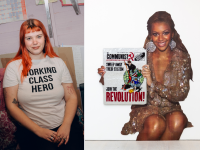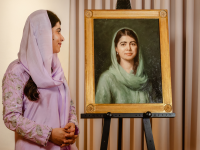It is with great sadness that LMH announces the death on 29 July 2021 of the distinguished medieval historian Susan Reynolds, alumna, Tutorial Fellow and Honorary Fellow of the College. Susan Reynolds read History at LMH 1947-50 and was Fellow and Tutor in History between 1964-86. Her career included a stint at the Institute of Historical Research, London, working for the Victoria County History and as Visiting Professor at Dartmouth College. She was elected a Fellow of the British Academy in 1993 and an Honorary Fellow of LMH in 2019.
Susan was the eminent author of ground-breaking and often controversial historical scholarship. Her two best-known books, Kingdoms and Communities in Western Europe, 900-1300 (1984) and Fiefs and Vassals: The Medieval Evidence Reinterpreted (1994) exercised enormous influence in the medieval field. It is indicative, perhaps, that her British Academy biography lists her current work as ‘medieval law and demolishing feudalism’. The editors of her festschrift, Law, laity and solidarities: Essays in honour of Susan Reynolds (MUP, 2001), remark that ‘Susan Reynolds’s work has mounted a coherent set of attacks along a broad front. She has shown an unremitting determination to distinguish between words and things, to revisit key sources and terms and to tackle misconceptions. She has subjected to critical examination the conceptual frameworks and terminology we apply to the past, urged us to unpick myths, for instance of race and nation, and to resist teleology.’
She is remembered with great fondness by her former students for her acumen, energy and intellectual rigour. Her love for historical research was infectious, and in tutorials she was thought of as being unfailingly kind, generous and humorous.
In 2008, Susan was interviewed for Making History. You can read what she had to say on her career, her historical interests, and what she considered important in history, in her own words here.
Memories from a former student
Tutorials, in her beautiful, airy, calm room overlooking the gardens, fizzed and sparkled as one learned intellectual rigour: ‘’What exactly do you mean by race?’’ when discussing Goths, Visigoths, Huns and Slavs. Even now, every time I put a dubious word in inverted commas, I can still hear her voice loud and clear ‘’You’re using them because you know the word isn’t right, but you’re going to use it anyway.’’
She had brilliant and memorable clarity when imparting academic skills or providing knowledge, whether historical or practical. We had all had to sign a disclaimer in case we fell in the river from a college punt, which was questioned by those who could swim. She gave sensible informative replies about exactly what river bugs might infect us and how they might do so – none of the ‘’because we say so’’ one might encounter in later corporate life.
We were made to feel part of an academic heritage, sometimes being told anecdotes about ‘’your tutorial grandmother.’’
Miss Reynolds was fun, an outstanding teacher, full of a wealth of fascinating knowledge and with a genuine and practical care for her students. I am grateful for the insights and skills she gave me.
Belinda Knight (1976)


